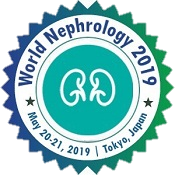
Chanchana Boonyakrai
Taksin Hospital, Thailand
Title: Prevalence and predictors of glomerular filtration rate decline in patients with diabetic kidney disease using RAAS blocking agents
Biography
Biography: Chanchana Boonyakrai
Abstract
Background: Diabetes confers an increased risk of deteriorating renal impairment. The role of Renin Angiotensin Aldosterone blocking agent (RAAS blocking agent) in treatment diabetic kidney disease needs re-evaluation. The effects of RAAS blocking agents in inappropriate administration (defined as sub-optimal or overdose) on renal event in patients with diabetes were assessed.
Method: In this retrospective 2-year period study from 2016 to 2017, patients with type 2 diabetes were treated with Angiotensin Converting Enzyme (ACE) inhibitors or angiotensin receptor blockers. Multivariable logistic regression model was used to access the risk factors of the rapid decline estimated Glomerular Filtration Rate (eGFR) compared with non-rapid decline eGFR. Secondary renal outcome were composites of new-onset persistent albuminuria in appropriate used RAAS blocking agent compared with inappropriate usage.
Result: Of total 500 patients, 195 (39%) subjects developed to rapidly decreased eGFR of more than 5 ml/min/1.73 m2 over one year. There were the significant difference between the rapid decline eGFR group and non-rapid eGFR group, including myocardial infarction (8.21% vs. 1.97%; p=0.001), angina pectoris (10% vs. 2%; p=0.001) higher level of albuminuria (746.37 vs. 281.68 mg/g; p=0.017) and lower level of serum albumin (3.93 vs. 4.22 mg/dl; p<0.001). Multiple logistic regression analysis revealed the significant associations between rapid decline eGFR and myocardial infarction (adjusted odds ratio 3.37 [95% CI 1.24, 9.15]; p=0.017), angina pectoris (adjusted OR 5.49 [95% CI 1.13; 26.74]; p=0.035) and hypo albuminemia (adjusted OR 2.77 [95% CI 1.31, 5.85]; p=0.007). Analysis of RAAS blocking agent showed that there were 281 (56.2%) patients received inappropriate RAAS blocking agents and 219 (43.8) patients received appropriate RAAS blocking agents. There was the significantly association with the risk of new onset micro albuminuria 22% in patients received inappropriate RAAS blocking agents comparing with patients received appropriate RAAS blocking agents (RR 1.22 [95% CI 1.05; 1.43]; p=0.006).
Conclusion: Cardiovascular disease, albuminuria and hypoalbuminemia are the major risk factors leading to rapid decline eGFR developing in type 2 DM patients received RAAS blocking agents. Moreover, the appropriate RAAS blocking agents should be the concerned issue.

